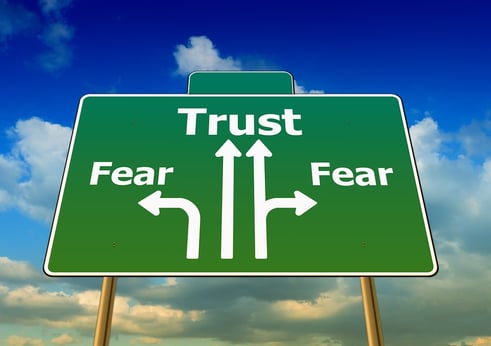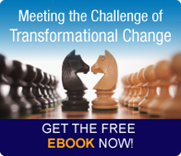There’s little doubt that building a “high-trust” organization is desirable if you are in the throes of transformational change. It’s helpful to have respect between employees and leaders, and there may well be a correlation between trust and credibility and employee performance. 
But there are also implications between organizations with high-trust and transformational change success. Trust and speed are functional. High-trust organizations are able to move much more quickly than low-trust organizations. Since speed is a competitive advantage, there are critical business reasons for building a high-trust organization.
How Sponsors Build Trust
Sponsorship is an “active condition” defined by both action and organizational position. Sponsors must Express, Model, and Reinforce (EMR) their individual commitment to the change in order for the change to gain sustained user adoption and ultimately Return on Investment. Trust is built when what Sponsors say is aligned with what they do and what they reinforce.
For example, if you are involved in a transformational change around customer service excellence and your leaders talk about service excellence, but model and reinforce cost containment above all else, you have non-alignment.
Many projects rely on messaging with much less attention paid to Sponsor modeling and reinforcement. It’s worth noting that when what is expressed by a Sponsor is not aligned with what the Sponsor does, or even more importantly, what the Sponsor reinforces, credibility and trust are eroded. Even more significantly, this lack of trust in leadership can show up in how those employees treat your customers.
High trust, high speed. Low trust, low speed.
Getting alignment around EMR is a simple formula for building trust and speed, but it requires a significant amount of business discipline to make it happen, especially when facing the complexity of transformational change.
In addition, at the project level, organizations must take the requisite time to define the “human objectives” for projects, just as the business and technical objectives are defined. Unless Sponsors are aware of what the new behaviors are, they can’t provide the required reinforcement.
If Sponsors are reinforced only for the accomplishment of business and technical objectives, and not for the accomplishment of the human objectives, they will likely not provide the reinforcement needed with their own direct reports.
Organizational Impacts
The impact of this erosion of trust is not just on the immediate project. Long after the project is deemed dead or disappears from the list of organizational priorities, the organizational memory is retained.
As a result, not only are the strategies less likely to be accomplished, projects will take longer and cost more. As confidence in leadership is eroded, the resistance to changes increases, and future changes are slowed down or more likely to fail. Organizations with too much going on, and with an unsuccessful past history will require more resources and time to create readiness for change.
It becomes a vicious cycle, as leaders pile on more strategic “priorities”, providing inadequate resources for implementing all of the changes, and thereby creating greater stress and lower trust. Everything slows down.
Remedial Actions for Successful Transformational Change
Building a high-trust organization begins at the top. Since “awareness is the first step to recovery," there is great value in making leaders aware of the organization’s own implementation history and the implications for current and future initiatives.
Using the data obtained from assessing past history, leaders can develop new strategies and tactics that will support trust-building. On a project by project basis, leaders should signal that “this time will be different” by how they communicate, what they model, and what they reinforce.


